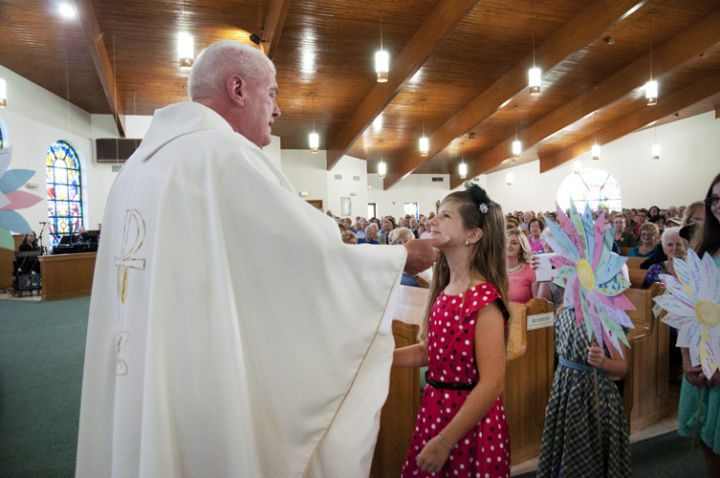
SEBASTIAN — Father John Morrissey, the affable and adored pastor of Saint Sebastian Catholic Church whose vocation has spanned five decades and sent him across the globe, celebrated the 50th anniversary of his ordination last Sunday.
About a dozen priests, Bishop Gerald Barbarito of the Diocese of Palm Beach, hundreds of parishioners, friends and family members marked the milestone during a special Mass in honor of “Father John.”
“One of the lasting impressions I have after living in so many cultures is that a smile speaks all languages,” Father John said in a 10-minute homily spoken with a heavy Irish brogue during the afternoon service that featured a choir, a special presentation by children of the parish and sentiments shared by the bishop.
“No matter where you go, people always respond to a friendly greeting,” said Father John, who is known for positioning himself outside the church a half an hour ahead of Mass and for a half hour after to have a welcoming or parting word with everyone coming through the doors.
“Once you strip off the superficial differences of color, dress and language, people are all the same,” he said. “People, the world over, have the same desires, hopes and aspirations.”
They want to be treated with respect, loved and accepted as equals, he said.
Bishop Barbarito told the roughly 400 people spread throughout the sprawling church located on U.S. 1 that the priest’s humanity “shines forth in his life. He reaches out to you and touches your heart. He’s not above you, but with you.”
Father John, whose congregation consists of 2,000 registered families, came to Sebastian in 2000 after spending a few years in the Major Seminary in Boynton Beach. After that, he became part of the diocese of Palm Beach where he spent two years in St. Thomas More parish and four years in St. Joseph’s in Stuart before arriving in Sebastian nearly 14 years ago.
Born in County Clare, Ireland, in 1938 to parents who were farmers, he was the 10th of 13 children. Two of his brothers became priests and two sisters joined the convent.
His brother, Father Martin, came from South Africa to help celebrate.
Father Michael, another brother, died five years go.
“I have a farmer’s basic faith,” Father John said while detailing the confluence of events that led to his times in remote parts of the world, as well as more populated areas. “I have only two people to keep happy – the Man Above and myself.”
Parishioners know they can stop by the rectory any time to chat, while he fixes a kettle. But the tall, white haired, blue-eyed 75-year-old priest takes time to hit the gym daily and walk the treadmill “to do away with my frustrations.”
He avoids sweets, often greets female parishioners with a peck on the cheek – thus his nickname, “The Kissing Priest” – and loves studying scripture.
After being ordained in December 1964 at the Diocese of Meath in Ireland, he became the pastor of a small parish in South Korea. He then spent a year in Rome, followed by a year in Boston.
Between 1976 and 1980, he was assigned as a professor of moral theology at the seminary in Dalgan, Ireland, followed by a few years at St. Kevin’s Parish in Dublin.
He then moved to the Fiji Pacific Regional Seminary in Suva, Fiji, from 1983 to 1989 to teach moral theology where the Columban priests worked. He considers those years his most fulfilling.
Years later, when he would become the pastor of St. Sebastian, he was asked by parishioners if he was going to stay. He responded that if he liked the place, he would.
To which one of the parishioners replied, “Suppose we don’t like you?”
“I thought it was a very appropriate response,” he said with amusement.
Looking back over the arc of his religious life, Father John said he enjoys baptizing infants, first communion and confirmation because of the new lives entering into the church. He’s also found it rewarding to see parishioners get involved in parish life.
He’d like to see many more young families getting together and engaging in activities that are related to their faith and Catholic life.
“Without a strong family commitment to their religion, we cannot expect our youth to be drawn to a religious life,” he said.
Overall, he regards teaching as his strongest calling.
“I am more comfortable in the classroom than the pulpit,” he said.
The most challenging part of his job as pastor has been the administrative side and he expressed gratitude at having a competent staff to deal with that.
“I’m a shepherd,” he said, “a good listener.”



